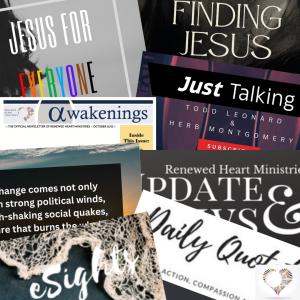
Let’s continue our pursuit of a socially engaged gospel. In 1958, responding to a complaint that someone’s pastor was talking about the NAACP during their sermon, Rev. Dr. Martin Luther King responded,
“Any religion that professes to be concerned about the souls of men [sic] and is not concerned about economic conditions that cripple them and the social conditions that damn them is a dry as dust religion in need of new blood. Therefore your minister by including so-called ‘worldly things’ in his sermon revealed that he is a man of great spiritual depth and deep civic conscience. He revealed his awareness of the fact that the gospel of Jesus Christ deals with the whole man [sic]—his [sic] body as well as his soul, the earthly as well as the heavenly.” (Rev. Dr. Martin Luther King, Jr. Advice for Living, September 1958)
Welcome Readers! Please subscribe to Social Jesus Here.
(Read this series from its beginning here.)
There are two ditches on either side of the paths we journey as Christians. One ditch is to be only focused on heaven. This is what some have referred to as being “so heavenly minded that we are no earthly good.” The other ditch is to only be focused inwardly on private and personal piety or a cosmic “relationship” to the exclusion of the center: our path following Jesus which is being a source of life-giving change in our world here and now.
It doesn’t matter which of these ditches we fall into. Whatever we believe, our beliefs should make us a more socially engaged and better humans in relation to our world we are living in today.
Why does this matter in relation to our text this week? This week’s passage is a favorite for those who live solely in either ditch. For those in the ditch of getting to heaven, the phrase “whoever believes in him shall not perish but have eternal life” has special resonance. For those focused on a private, individual relationship with Jesus or God’s love, the phrases “God so loved the world” and “God did not send his Son into the world to condemn the world” especially resonate. And rightly so.
While there may be some value in these beliefs, there is no reason why this passage should only belong to those who focus on them. This passage can also speak to those who care about making a difference in our material world and on personal and systemic suffering today.
Why can’t the condemnation in this passage be similar to how the Hebrew prophets defined divine condemnation? In the Hebrew prophets, condemnation was not focused on individuals but on people groups, societies, and communities. When their social systems engaged in harmful practices toward the poor, the stranger, the fatherless, or the widow (in a patriarchal society), that society would suffer divine condemnation. They understood that condemnation was expressed through a calamity, natural, military, or a combination of both. If the teaching in John was similar to the Hebrew prophets’ teaching, God did not send God’s son into the world to perpetuate this cycle of unsustainable injustice and the intrinsic fruit of oppression and violence, but to shows us a way out.
And this leads to us defining salvation socially not individually. We’ll begin with unpacking this idea, next, as we wrap up our consideration of a socially engaged gospel.
(Read Part 3)
Are you getting all of RHM’s free resources each week?
Begin each day being inspired toward love, compassion, action, and justice. Free
Sign-Up at:
https://renewedheartministries.com/














